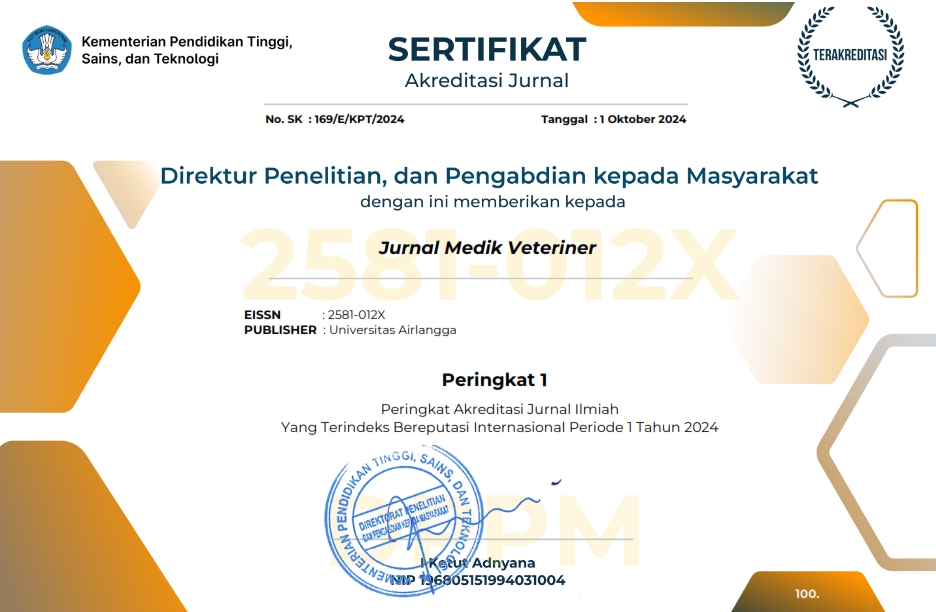Investigation of Trypanosoma evansi in Sumatran Elephant (Elephas maximus sumatranus) in Indonesia Using Various Methods

Downloads
Trypanosoma evansi is a widespread hemoprotozoa that causes trypanosomiasis in both livestock and wildlife. One of the susceptible animals is the Sumatran elephant, which is included in the endangered species category. The infection of this parasite often develops into chronic and sub-clinical forms in elephants, therefore it may become unnoticed and hard to diagnose. This study aimed to analyze and evaluate the infection of T. evansi in semi-captive Sumatran elephants in Way Kambas National Park, Indonesia, using various diagnostic tests. The prevalence of T. evansi in a total of 53 Sumatran elephants was estimated using a card agglutination test for trypanosomiasis (CATT) in 2016. A longitudinal study was later conducted in 2019 using Giemsa stained blood smear (GSBS) and polymerase chain reaction (PCR). The results showed that 26.4% of samples (14/53) were positively detected by both CATT in 2016 and PCR in 2019, while GSBS was unable to detect the parasites in all samples. Furthermore, four individuals were confirmed to have persistent infections. This study concluded that the ability of CATT and PCR were more convincing over GSBS for the diagnosis of sub-clinical trypanosomiasis in Sumatran elephants. However, it is recommended to use a combination of CATT as a screening tool and PCR as a confirmatory test for reliable results.
Abdel-Gawad, A., Nassar, A., & Abdel-Wahab, A. (2019). Evaluation of the Card Agglutination Test (CATT/T. Evansi) in comparison with PCR for detection of Trypanosoma evansi infection in donkeys in Egypt. Journal of the Egyptian Society of Parasitology, 49(3), 539–542.
Abdel-Rady, A. (2008). Epidemiological studies (parasitological, serological and molecular techniques) of Trypanosoma evansi infection in camels (Camelus dromedarius) in Egypt. Veterinary World, 1(11), 325–328.
Anderson, N. E., Mubanga, J., Fevre, E. M., Picozzi, K., Eisler, M. C., Thomas, R., & Welburn, S. C. (2011). Characterisation of the wildlife reservoir community for human and animal trypanosomiasis in the Luangwa Valley, Zambia. PLOS Neglected Tropical Disease, 5(6), 1–16.
Arifin, K., Kusnoto, K., Yudhana, A., Sunarso, A., Purnama, M. T. E., & Praja, R. N. (2019). Prevalence of Haemonchiasis on Etawah Crossbreed Goat in Kalipuro, Banyuwangi. Jurnal Medik Veteriner, 2(2), 108.
Aslam, A., Chaudhary, Z. I., Rehman, H., Ashraf, K., Ahmad, N., Yaqub, T., Maqbool, A., & Shakoori, A. R. (2010). Comparative evaluation of parasitological, serological, and DNA amplification methods for diagnosis of natural trypanosomal infection in equines. Pakistan Journal of Zoology, 42(4), 371–376.
Camoin, M., Kocher, A., Chalermwong, P., Yangtarra, S., Thongtip, N., Jittapalapong, S., & Desquesnes, M. (2018). Adaptation and evaluation of an ELISA for Trypanosoma evansi infection (surra) in elephants and its application to a serological survey in Thailand. Parasitology, 145(3), 371–377.
Desquesnes, M., Holzmuller, P., Lai, D., Dargantes, A., Lun, Z., & Jittapalapong, S. (2013). Trypanosoma evansi and surra: a review and perspectives on origin, history, distribution, taxonomy, morphology, hosts, and pathogenic effects. BioMed Research International, 2013, 1–22.
Dobson, R. J., Dargantes, A. P., Mercado, R. T., & Reid, S. A. (2009). Models for Trypanosoma evansi (surra), its control and economic impact on small-hold livestock owners in the Philippines. International Journal for Parasitology, 39(10), 1115–1123.
EFSA AHAW Panel (EFSA Panel on Animal Health and Welfare), More, S., Bí¸tner, A., Butterworth, A., Calistri, P., Depner, K., Edwards, S., Garin-Bastuji, B., Good, M., Schmidt, C. G., Michel, V., Miranda, M. A., Nielsen, S. S., Raj, M., Sihvonen, L., Spoolder, H., Stegeman, J. A., Thulke, H. H., Velarde, A., Willeberg, P., Winckler, C., Baldinelli, F., Broglia, A., Candiani, D., Beck, B. B., Kohnle, L., Morgado, J., & Bicout, D. (2017). Scientific opinion on the assessment of listing and categorisation of animal diseases within the framework of the Animal Health Law (Regulation (EU) No 2016/429): Trypanosoma evansi infections (including surra). EFSA (European Food Safety Authority) Journal, 15(7), 1–34.
Eleizalde, M. C., Gómez-Piñeres, E., Ramírez-Iglesias, J. R., & Mendoza, M. (2021). Evaluation of five primer sets for molecular detection of Trypanosoma vivax by polymerase chain reaction (PCR) and their implementation for diagnosis in naturally infected ruminants from Venezuela. Veterinary Parasitology: Regional Studies and Reports, 25, 1–7.
Elhaig, M. M., Youssef, A. I., & El-Gayar, A. K. (2013). Molecular and parasitological detection of Trypanosoma evansi in camels in Ismailia, Egypt. Veterinary Parasitology, 198(1–2), 214–218.
Fernández, D., Baradat, B. G., Eleizalde, M., Marcano, E. G., Perrone, T., & Mendoza, M. (2009). Trypanosoma evansi: a comparison of PCR and parasitological diagnostic tests in experimentally infected mice. Experimental Parasitology, 121(1), 1–7.
Kuncoro, P., Rosa, E., Rustiati, E. L., & Candra, D. (2017). Identifikasi ektoparasit pada gajah Sumatera (Elephas maximus sumatranus) di Pusat Latihan Gajah Taman Nasional Way Kambas. Jurnal Biologi Eksperimen dan Keanekaragaman Hayati, 4(2), 51–54.
Kyari, F., Mbaya, A. W., Biu, A. A., Adamu, L., & Dennis, O. O. (2021). Seroprevalence of Trypanosoma evansi in camels using CATT/T. evansi technique in Borno and Yobe states, Nigeria. Parasite Epidemiology and Control, 13, 1–26.
Masiga, D. K., Smyth, A. J., Hayes, P., Bromidge, T. J., & Gibson, W.C. (1992). Sensitive detection of trypanosomes in tsetse flies by DNA amplification. International Journal for Parasitology, 22(7), 909–918.
Mossaad, E., Ismail, A. A., Ibrahim, A. M., Musinguzi, P., Angara, T. E. E., Xuan, X., Inoue, N., & Suganuma, K. (2020). Prevalence of different trypanosomes in livestock in Blue Nile and West Kordofan States, Sudan. Acta Tropica, 203, 1–6.
Njiru, Z. K., Constantine, C. C., Guya, S., Crowther, J., Kiragu, J. M., Thompson, R. C. A., & Dávila, A. M. R. (2005). The use of ITS1 rDNA PCR in detecting pathogenic African trypanosomes. Parasitology Research, 95, 186–192.
Nurcahyo, W. (2017). Penyakit surra pada hewan dan ternak. Samudra Biru, pp: 87–90.
Nurcahyo, W., Yowi, M. R. K., Hartati, S., & Prastowo, J. (2019). The prevalence of horse trypanosomiasis in Sumba Island, Indonesia and its detection using Card-Agglutination Tests. Veterinary World, 12(5), 646–652.
Panjaitan, C., Suprihati, E., Yudhana, A., Hastutiek, P., Wibawati, P. A., & Purnama, M. T. E. (2021). Acanthochephaliasis in White-lipped Green Pitviper (Trimeresurus insularis). Jurnal Medik Veteriner, 2021, 4(1), 155–159.
Purnamasari, K., Nursalim, M. T., Anggraeni, D. E., Suwanti, L. T., Estoepangestie, A. T. S., Raharjo, H. M., Wibowo, D. S., & Nurcahyo, W. (2021). Detection of Trypanosoma evansi in Sumatran elephant (Elephas maximus sumatranus) in Way Kambas National Park, Indonesia. Bangkok, Thailand, 29–30 April 2021, pp: 11–13.
Purnama, M. T. E., Dewi, W. K., Triana, N. M., & Ooi, H. K. (2021). Serum liver enzyme profile in Timor deer (Cervus timorensis) with fascioliasis in Indonesia. Tropical Biomedicine, 38(1), 57–61.
Ramírez-Iglesias, J. R., Eleizalde, M. C., Reyna-Bello, A., & Mendoza, M. (2017). Molecular diagnosis of cattle trypanosomes in Venezuela: evidences of Trypanosoma evansi and Trypanosoma vivax infections. Journal of Parasitic Diseases, 41(2), 450–458.
Reid, S. A. (2002). Trypanosoma evansi control and containment in Australasia. TRENDS in Parasitology, 18(5), 219–224.
Sudan, V., Jaiswal, A. K., Parashar, R., & Shanker, D. (2015). A duplex PCR-based assay for simultaneous detection of Trypanosoma evansi and Theileria annulate infections in water buffaloes. Tropical Animal Health and Production, 47, 915–919.
Syah, A., Basri, C., & Wicaksono, A. (2020). Incidence of Surra Disease on Beef Cattle in Barru Regency, South Sulawesi Province in 2015–2017. Jurnal Medik Veteriner, 3(2), 145–153.
Tapdasan, E. P., Baldrias, L. R., Mingala, C. N., Divina, B. P., Bajenting, G. P., & Salces, C. B. (2020). Prevalence and risk factors of Trypanosoma evansi infection in water buffaloes (Bubalus bubalis) of Ubay, Bohol, Philippines. Philippine Journal of Veterinary Medicine, 57(2), 164–175.
Tehseen, S., Jahan, N., Desquesnes, M., Shahzad, M. I., & Qamar, M. F. (2017). Field investigation of Trypanosoma evansi and comparative analysis of diagnostic test in horses from Bahawalpur, Pakistan. Turkish Journal of Veterinary and Animal Sciences, 41, 288–293.
Vellayan, S., Mohamad, A., Radcliffe, R. W., Lowenstine, L. J., Epstein, J., Reid, S. A., Paglia, D. E., Radcliffe, R. M., Roth, T. L., Foose, T. J., Khan, M. K. M., Jayam, V., Reza, S., & Abraham, M. (2004). Trypanosomiasis (surra) in the captive Sumatran rhinoceros (Dicerorhinus sumatrensis sumatrensis) in Peninsular Malaysia. Kuala Lumpur, Malaysia, 23–27 August 2004, pp: 187–189.
Copyright (c) 2024 Kartika Purnamasari, Wisnu Nurcahyo, Muhammad Tauhid Nursalim, Lucia Tri Suwanti, Agnes Theresia Soelih Estoepangestie

This work is licensed under a Creative Commons Attribution-NonCommercial-ShareAlike 4.0 International License.
Authors who publish in this journal agree to the following terms:
1. The journal allows the author to hold the copyright of the article without restrictions;
2. The journal allows the author(s) to retain publishing rights without restrictions;
3. The legal formal aspect of journal publication accessibility refers to Creative Commons Attribution-NonCommercial-ShareAlike 4.0 International License (CC BY-NC-SA).






11.jpg)




















